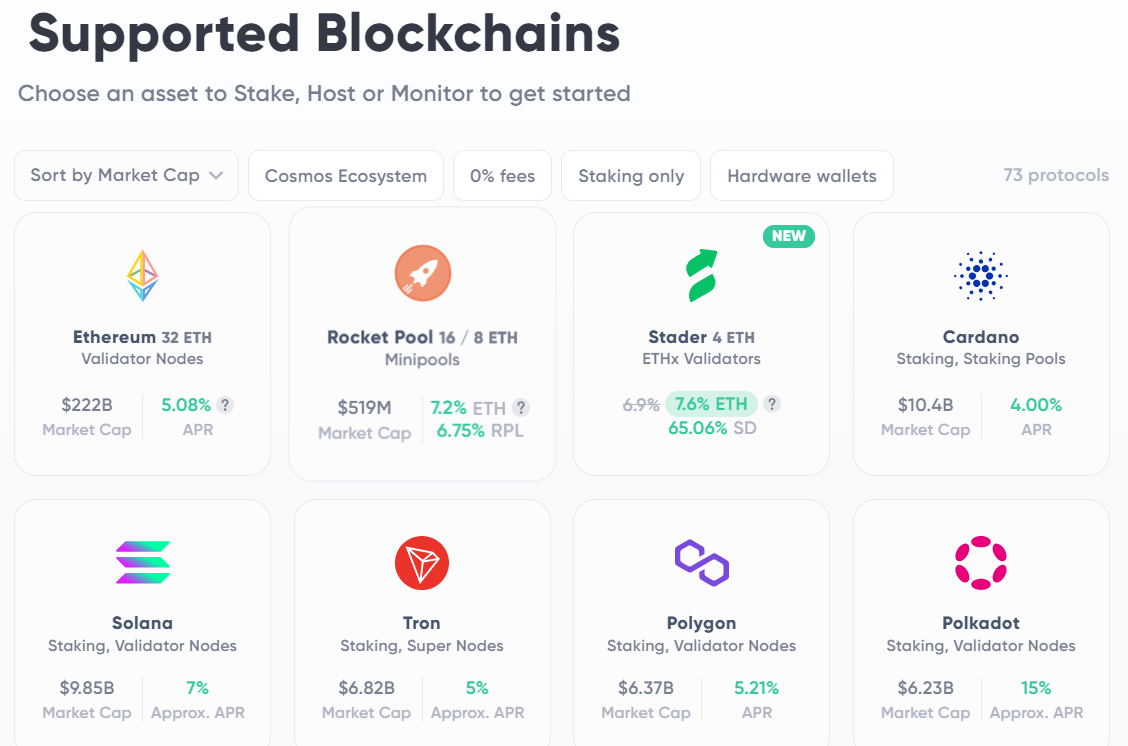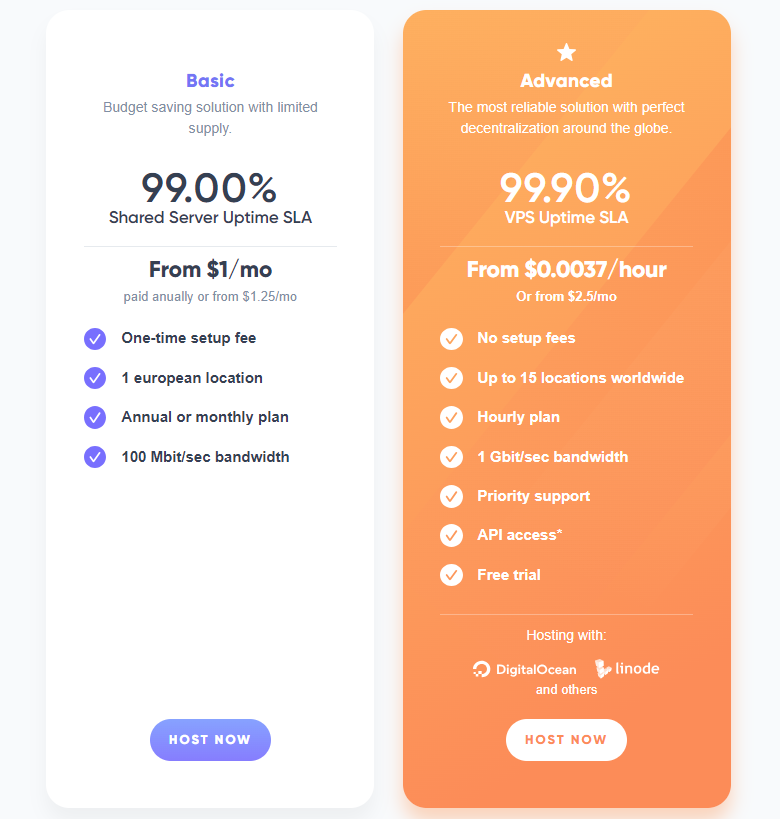
If you want to stake cryptocurrency or host your own nodes, you have plenty of options. But finding a platform that’s non-custodial yet still easy to use can be more challenging.
Thankfully, Allnodes offers both non-custodial cryptocurrency staking and a streamlined platform. And it even caters to individual traders and enterprise-level clients looking for serious infrastructure and node hosting support.
However, Allnodes isn’t the right choice for everyone depending on your goals and familiarity with cryptocurrency nodes and staking. So, our Allnodes review is covering how the platform works, its pros and cons, and what some of the top alternatives are that you can consider.
Pros
Cons
About Allnodes
Allnodes is a blockchain nodes hosting and staking platform that began in 2017 and was founded by Konstantin Boyko-romanovsky. The company lets you host nodes to validate and monitor blockchain transactions. Users can also stake over 70 cryptocurrencies to generate validator rewards as yield.
Overall, this decentralized platform is similar to staking platforms like Cake DeFi and YieldFlow. However, node hosting and enterprise solutions are a massive side of Allnodes’ business. In fact, the platform currently hosts over 43,000 nodes with a value of over $2 billion according to the company’s website.
Allnodes Features
Allnodes has a range of features and free utilities that cater to both individual crypto investors and institutions looking for infrastructural support. Here’s a look at each main feature and how you can begin earning with Allnodes.
Staking
If you’re just interested in generating yield with Allnodes with the platform, its staking service is what you’re looking for.
To get started, you simply choose the cryptocurrencies you want to stake and follow the steps to host a validator node. This involves depositing a certain amount of collateral and then setting up your private keys for that node. Your tokens are then used to help verify blockchain transactions as validator nodes, generating rewards in the process.
Allnodes handles all of the tech behind the scenes; you just need to deposit the necessary collateral and pay for monthly node hosting to begin earning.
At the time of writing, Allnodes supports 50+ tokens for staking. Some of the most notable tokens and corresponding APRs include:

These are competitive staking rates, and certain altcoins even pay above 25% APR.
However, one significant downside of Allnodes is that some tokens require significant collateral to host a node. For example, you need to deposit 32 ETH to stake Ethereum, which is worth almost $60,000 at the time of writing.
In contrast, some staking platforms let you deposit smaller amounts into liquidity pools or still let you earn staking rewards with smaller amounts.
Node Hosting
Aside from staking, Allnodes also lets you host your own nodes with its platform. Blockchain nodes are what track and validate a blockchain’s ledger, ensuring that everyone in the network has an identical ledger of blockchain transactions and is on the same page.
This service is useful for teams that are developing cryptocurrencies and blockchain-related projects and require the infrastructure to maintain their projects.
Allnodes also lets you host different types of nodes, including Masternodes and Sentry nodes. The former node type helps verify new blockchain blocks and help with governance, whereas the latter are responsible for protecting validator nodes from becoming overwhelmed with requests.
There’s a fair bit of blockchain knowledge someone would need before wanting to host their own masternode or sentry node. But in short, Allnodes has both staking and infrastructure solutions depending on your needs.
Address Monitoring
Allnodes also offers node monitoring as a free service, even if you’re hosting the node elsewhere. All you have to do is select the asset you want to monitor and enter your wallet address to begin monitoring. From there, Allnodes sends you updates about node status and performance.
You can also enable the Allnodes Bot to get updates via Telegram, Discord, and Slack so you’re always up to date.
Allnodes Pricing & Fees
Allnodes has variable pricing depending on the type of node you want to host and the type of server you want.
For node hosting, there are two plans: Basic and Advanced. Each plan advertises 99.00% or higher uptime with different speeds and server locations, and pricing starts at $1 and $2.50 per month for each respective plan:

You also pay various fees for hosting validator nodes or full nodes. For example, running a validator node for staking Ethereum starts at $5 per month or $0.0148 per hour if you prefer hourly billing. But it costs $480 per month to host a full node through Allnodes’ Advanced plan.
This pricing might seem a bit complex versus major crypto exchanges or staking platforms that have certain fixed fees. But this is because Allnodes offers everything from staking services for individuals to infrastructural solutions for enterprise level clients.
Allnodes Alternatives
Allnodes can support anyone from a beginner crypto staker to enterprise-level clients who need extensive infrastructural support. But depending on your needs and familiarity with staking, some Allnodes alternatives could be better options:
- YieldFlow: One of the newer DeFi staking platforms on the market.
- Bloq: This company provides infrastructure services for DeFi, Web3, and metaverse applications.
- Bake (Cake DeFi): Another secure way to generate yield through staking and liquidity pools.
Account Opening Process
Allnodes is a decentralized solution, which means you don’t have to give up control of your private keys or make deposits onto the platform to create an account. Signing up is also free and just requires entering your email, password, and then verifying your email address.
From there, Allnodes has a step-by-step guide for setting up different nodes. As mentioned, collateral amounts vary depending on the token, but Allnodes integrates with popular crypto wallets like Coinbase, Ledger, MetaMask, and Trezor to easily verify your crypto before creating validator keys for you.
Safety & Security
Allnodes is one of the leading node hosting platforms on the market, with tens of thousands of nodes hosted. It also works with enterprise-level clients like Crypto.com, MetaMask Institutional, and OKX.
The platform is safe and secure, and its main selling point is that it’s decentralized, so you don’t have to give up control of your crypto. In contrast, going with centralized exchanges means your coins leave your wallet, which can end up with investors holding the bag, which we’ve seen with companies like Celsius and FTX.
All Allnodes states in its blog post, validator keys “do not allow Allnodes or anyone to withdraw your funds. Only you, the wallet owner, with your mnemonic or seed phrase, can withdraw your funds. You never share your seed phrase or private withdrawal keys with anyone, including Allnodes.”
Customer Service
You can contact Allnodes’ customer support by emailing [email protected]. The company also has a Telegram and Discord server where you can questions and get in touch with customer support if you’re having difficulties.
The company also has a 4.8 star rating on Trustpilot with over 350 reviews. Positive reviews often cite responsive customer support, ease-of-use, and the fact that Allnodes is non-custodial.
The Bottom Line
There are plenty of centralized and decentralized options out there for staking cryptocurrency or hosting nodes. And while Allnodes might seem a bit intimidating for beginners, it’s actually a very streamlined and easy-to-use platform if you spend a few minutes reading what it has to offer.
The fact it’s non-custodial is also one of its main selling points. If you want to stake your tokens without giving up control of them, Allnodes could be the solution you’re looking for.

Tom Blake is a personal finance writer with a passion for making money online, cryptocurrency and NFTs, investing, and the gig economy.

